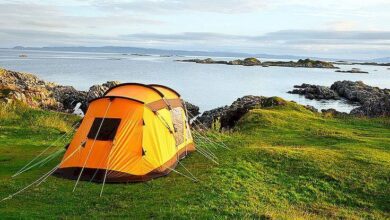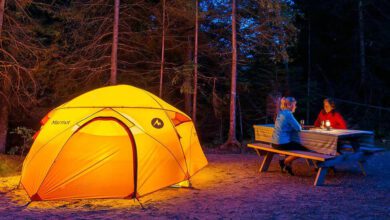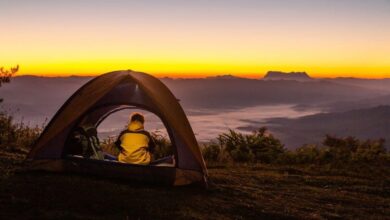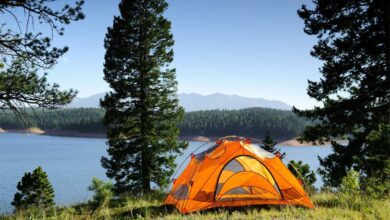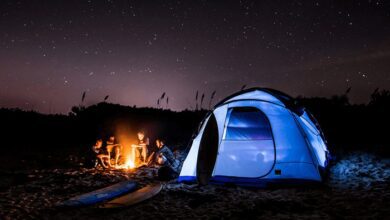If you want to enjoy a fun and comfortable solo camping experience in nature, choosing the right gear and thorough preparation are crucial. Below you’ll find the essential camping equipment, the must-have items in each category, and key considerations.
1. Shelter & Sleeping Equipment

- Tent:
- Capacity: according to number of people (solo 1–2 person, family 3–4 person)
- Waterproof rating (≥2,000 mm hydrostatic head) with sealed seams
- Lightweight and compact pack volume
- Extras: insect-proof floor, ventilation vents
- Sleeping Bag:
- Temperature rating for season (summer/winter/3-season)
- Fill type: synthetic (better in damp) or down (lighter, more compact)
- Size and weight
- Sleeping Pad or Inflatable Mat:
- Insulation (R-value)
- Comfort and thickness
- Inflation/deflation time
2. Cooking & Dining Equipment

- Camp Stove:
- Gas (canister) or multi-fuel (white gas, kerosene)
- Flame control and safety lock
- Cookware Set:
- Lightweight materials: aluminum or titanium
- Folding handles, comes with lids
- Utensils:
- Foldable fork-spoon set, multi-tool knife
- Lightweight plate/cup (polycarbonate or titanium)
- Lighter and waterproof matches
- Cleaning Supplies:
- Biodegradable dish soap
- Microfiber cloth
3. Clothing & Personal Gear

- Layered Clothing:
- Base layer: moisture-wicking thermal underwear
- Mid layer: fleece or lightweight wool
- Outer layer: waterproof, windproof jacket
- Footwear & Socks:
- Waterproof, breathable trekking boots
- Spare moisture-wicking socks
- Hat, Gloves & Buff:
- For sun protection or extra warmth in cold
4. Lighting & Electronics

- Lantern & Headlamp:
- Adjustable brightness, long battery life
- Extra batteries or rechargeable model
- Power Bank & Charging Cable:
- For phone, GPS device, and small electronics
- Phone & GPS:
- Spare charging or solar-compatible charger
5. Safety & First Aid

- First Aid Kit:
- Basic bandages, wound dressings, antiseptic solution, scissors, pain relievers
- Knife / Multi-Tool:
- Includes knife, pliers, screwdriver functions
- Navigation Tools:
- Map & compass as backup to electronics
- Emergency Signaling:
- Whistle, signaling mirror, or flare
6. Water & Food Storage

- Water Bottle / Canteen:
- At least 1.5–2 liters capacity
- Water purification tablets or portable filter
- Food Packaging:
- Durable, resealable bags
- Trash & waste bags (“Leave No Trace”)
7. Other Useful Items

- Sunscreen & Insect Repellent:
- High SPF protection
- Eco-friendly formula
- Towel & Personal Care:
- Microfiber towel
- Biodegradable soap
- Tent Repair Kit:
- Patch kit, extra stakes, spare cord
- Backpack:
- Shoulder & hip support, rain cover
Tips & Final Recommendations

- Do a Trial Run: Test your gear at home or nearby to identify any gaps.
- Prioritize Lightness & Functionality: Ask yourself, “Do I really need this?” for every item.
- Use Waterproof Packing: Keep electronics and clothes dry with waterproof bags.
- Bring Spare Parts: Small extras like zip ties or cord can be lifesavers.
- Create a Checklist: Prepare a pre-trip list to reduce the risk of forgetting anything.
With the right gear selection and thorough preparation, your time outdoors will be both comfortable and safe. Enjoy your camping!
